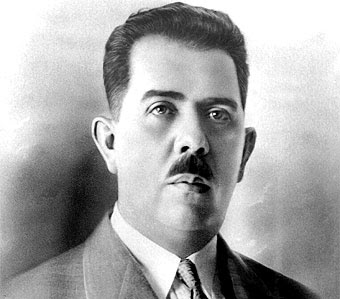Biography: Lazaro Cardenas | Military and Mexican politician who was President of Mexico.
(Lázaro Cárdenas del Río; Jiquilpan, 1891 - city of Mexico, 1970) military and Mexican politician who was President of Mexico from 1934 to 1940. Remembered and loved as one of the major Mexican statesmen of all time, Cardenas did more than any other President to consolidate the Mexican Revolution and to implement their ideals of Justice and equality. 
Lázaro Cárdenas
Lázaro Cárdenas
Lázaro Cárdenas
Strong supporter of policy modernization and democratic, Lázaro Cárdenas promoted the education at all levels, stimulated the formation of trade unions, renewed public administration and promoted, as no one land reform had done before. His nationalist convictions led him to nationalize the railways in 1937 and, the following year, the oil industry, which was in the hands of British and American companies. Its positioning in favor of workers and peasants against the interests of the powerful and the defense of natural resources against the interference of foreign companies provided him a prestige and an aura of honesty that would retain after leaving the Presidency.
Coming from a very modest indigenous family, Lázaro Cárdenas del Río received only elementary education. In 1914 he joined the Mexican Revolution (which had erupted four years earlier), giving start to a military career that would be quickly: ten years later was already general of Brigade. During the Constitutionalist cause he defended, he was appointed head of operations in Veracruz and Michoacán and was wounded at the battle of Huejotitlan (1923).
Lazaro Cardenas jumped into politics under the protection of another revolutionary military, President Plutarco Elías Calles. In 1928 he was elected Governor of Michoacan, charge that it took to perform an important reform work that proved his political mettle in nationwide: it created numerous schools, he promoted the distribution of land and promoted trade union associations and the democratisation of the University. Later he was Minister of the Interior (1930-32) with Pascual Ortiz Rubio and Minister of war (1932-34).
In 1934 he won the presidential election, always under the protection of streets, which was exerting great influence in Mexican political life; but once in power, Lazaro Cardenas was emancipated from his tutelage and adopted a political line itself, more inclined to the left. It came even to expel from the country to the old guard, which had to go into exile in the United States (1936). He created the revolutionary Mexican Party (forerunner of the subsequent PRI), in which is integrated a broad spectrum of reformists and progressives: Communists and Socialists, radical Liberals, the Confederation of Mexican workers and the National Confederation of farmers.
Under the motto "Mexico for Mexicans", Cardenas led a nationalization policy, especially important with regard to oil; This pitted him with United States and forced him to seek buyers in Germany. It also dealt with protecting the indigenous population, he promoted agrarian reform, fought large estates, nationalized the railways and established a secular, free and compulsory public education. In short, everything a socializing the Mexico turn post-revolutionary, which must be seen in the context of the worldwide economic depression of the 1930s and the New Deal of Franklin Roosevelt in the United States.
Lázaro Cárdenas
These realizations you should highlight his ambitious agrarian reform program. The Cárdenas Government organized the distribution of more than eighteen million hectares between destitute Mexicans, almost double of what all the Governments of his predecessors together had come to distribute. But the distribution of lands without providing the necessary infrastructure services leads to a subsistence agriculture in which the peasant is able to feed his family, but not producing surplus for the market. To avoid the problems of supply of cities and the export market, Cardenas resorted to a communal system genuinely Mexican, the ejido. The ejidos included hundreds of families to which the cooperative credit Bank provided funding, schools and hospitals.
Of paramount importance was the question of oil, in which Cardenas showed his bravery and knew how to stay firm against the United States. When in 1938 he announced the expropriation of U.S. and British oil companies, measure that had the support of the whole country, the reaction of the US capital was to ask Roosevelt intervention. President Roosevelt, however, had advocated the non-interference in neighbouring countries with its policy of "good-neighbourliness". The Cardenas Administration created a State-owned monopoly, Petroleos Mexicanos (PEMEX), true flagship of the nationalization of resources, and managed, not without certain initial difficulties, overcome the international boycott to Aztec oil.
More controversial was the implementation of a "Socialist" education, term that was shrouded in vagueness; but, apart from the ideological problem, education spread throughout the country and arrived in sectors and large rural areas that had never reached: the number of schools has doubled in six years. The reception of Cardenas dispensed to the Spanish Republican refugees, was significant in the fight against rising fascism at the time, lost the Civil war in 1939, fled Franco's regime.
The presidential term of Cardenas, in short, was a period of political stability that bequeathed to posterity significant advances in the field of economy, education and public works. Cardenas left the Presidency in 1940, but not the political life, which continued to exercise considerable influence: he promoted the candidacy of Manuel Ávila Camacho, which happened in the period 1940-1946, and he accepted the post of Minister of Guerra between 1942 and 1945. Also collaborated with the President Adolfo López Mateos (1958-1964).
Extracted from the website: Biografías y Vidas
